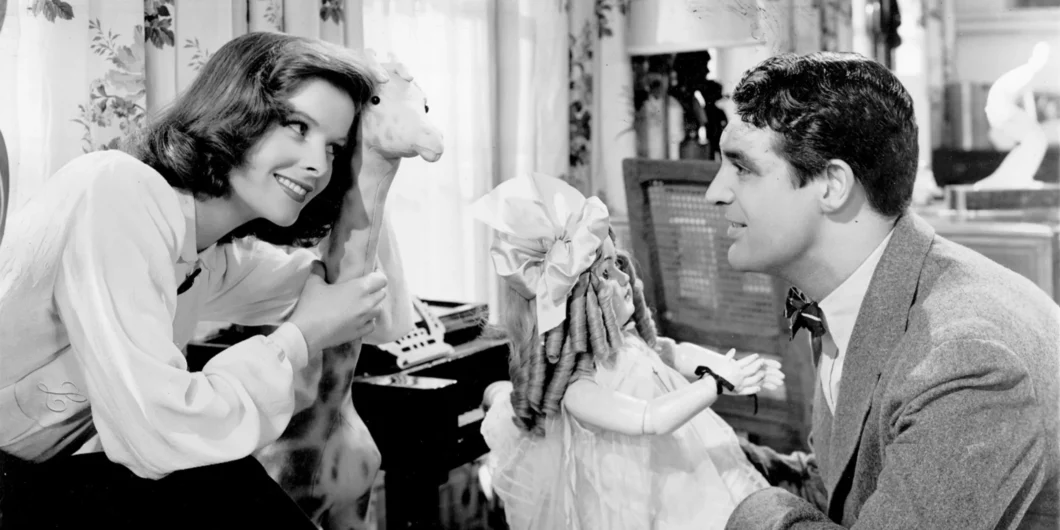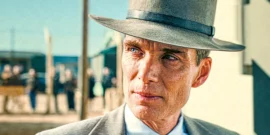Oppenheimer is about more than just the man. It explores the moral agony that comes with the power to destroy the world.
Remembering Holiday
Cary Grant was the most beautiful man in old Hollywood, the kind of actor that made people think of words like star. Katharine Hepburn may have been the most admired actress, at least to judge by her four Oscars. They seem to have been made to be a screen couple in the era of romantic comedies, but this hardly ever happened. Their first such pairing, Bringing up Baby (1938), was a box office failure, though now considered a classic. Their second, that same year, was Holiday, a fine New Year’s movie, which shares the bittersweet character of that holiday, and which I recommend to readers.
Holiday is not as well known as it deserves, because it seems like a dress rehearsal for Grant and Hepburn’s big success, The Philadelphia Story (1940), which got seven Oscar nominations and won two awards. Aside from its stars, the movies share the same director, the great George Cukor, the same screenwriter, David Ogden Stewart, adapting the same playwright, Philip Barry. Even the same theme: what kind of marriage will a modern woman of the upper class make and what that says about the future of America.
These movies were prescient about our way of life, remarkable for giving pleasure while also giving warning about the difficulties we’d face. The Philadelphia Story predicted that divorce would become an important part of the American way of life, perhaps the defining feature of marriage; Holiday predicted the gap year and its related ideas of finding oneself when young, as well as the young generation’s rejection of work.
Modern America
Holiday starts with Johnny Case (Cary Grant), engaged to be married to a glamorous young woman, Julia Seton, whom he met on holiday at glamorous Lake Placid. They’re in love and that’s all that matters, they will be married! Back in Manhattan, just before Christmas, he learns it’s more difficult than that. He has to be introduced to Julia’s family, the very wealthy and yet unhappy Setons. The father of the family, Edward Seton, is in banking, a widower. His oldest daughter, Linda (Hepburn), is a spinster who rejects the respectability of wealth and would rather join a moral crusade—something Progressive. His youngest, son Ned (Lew Ayres), wanted to be a musician and, since his father compels him to work at the bank, has turned to drink. Only middle child Julia, the apple of his eyes, is what he expected of his children, until she falls in love with Case.
The problem with Johnny Case is that he is not wealthy, or at any rate, not yet. He comes from the lower classes and worked his way through Harvard and onto Wall Street. The father, of course, opposes such an incautious union. Wealth presents the same barriers more or less at all times. What’s unusual is why Julia loves Johnny: She sees in him her grandfather, who made the family fortune in the first place. A very clever girl, indeed.
Now, from Johnny’s point of view, the problem is that he doesn’t know what he’s so successfully working for. His Lake Placid holiday, the first of his life, finds him on the cusp of manhood. He’s just made a big success of himself in business and has fallen in love. His idea is not just to marry and go on honeymoon, but take a holiday to figure out what to make of his freedom. He can afford it—work has been paying off—and he feels he needs it. Far from trying to marry into wealth, he’s not particularly interested in anything but what youth consists of, which is finally in his grasp. And to see Cary Grant in the role is almost to believe in love of freedom. But his prospective father-in-law is immune to his charm.
All the problems of modern America thus come to light as problems concerning the young, that is, problems of education, which is a natural attitude for comedy. The great continental democracy is also a commercial republic, and uniquely successful. After the Civil War and industrialization, prosperous peace seemed easy to take for granted. But the problems of wealthy people are not the same as those of the poor, nor the temptations or vices. The aspirations of the talented changed in order to match national success—the largest, richest, most technologically advanced democracy in history. The beautiful ideas that animate the young changed in the process, since suddenly everything seemed to be possible, perhaps even imminent, given the pace of change, and national optimism interpreted that change as improvement. This new context by itself makes the older opinions seem obsolete. America bears reexamining in light of this surprising conflict caused by success, and Holiday is one of the finer stories that dramatize that reexamination, comparing young Johnny Case with aging Edward Seton.
Modern Women
Man of the people Johnny Case and daughter of the elite Julia Seton should make a perfect pair. They have much in common—they’re young, beautiful, and in the same business. The story almost writes itself, it’s all about meritocracy, ascending into the elite. But Holiday shows there’s a great psychological problem facing such a happy end: freedom. Johnny wants to choose for himself. If he has to prove his merit in order to succeed—by the same measure, he thinks his employers and would-be in-laws should also prove themselves to him; and the more his early institutional success means his entire life is planned out for him, the less he can stand it.
This is what he has in common with the other two Seton siblings, whom he comes to appreciate more, Linda and Ned, the moralist and the artist—rejected figures in the story of American success, Romantics, if you will. Broadly, we reduce the arts to entertainment, indeed flattery; but so also with the generous moral sentiments which create demands on us. We thus turn those among us who love beauty more than wealth into resentful opponents of our commercial way of life, and our children prove their willing audience. Holiday doesn’t just show the dangers facing the elite, and therefore the American way of life—unhappy, demanding youth—it aims to educate and thus dignify youthful rebellion against conformism, in the name of freedom.
Holiday, therefore, is less about Johnny and Julia than it is about Linda. The youth rebellion, the result of American peaceful prosperity, is the emergence of a modern woman, independent and demanding. Women are often the protagonists in modern art—think of the nineteenth-century novel. Somehow, the story of civilization concerns them more, for they bring together natural love and political freedom. Hepburn runs away with a role tailored for her, the very model of modern moral Progress, showing everything sensitive in American character while retaining the prestige of theatrical acting and upper-class elegance, starting with her diction. She talks of wanting to be Joan of Arc or Florence Nightingale, or John L. Lewis (president of United Mine Workers), and of once joining workers on a strike, not realizing her father sat on the board of the respective firm. Hepburn declaims rather than speaks and when she is not ascending her deserved pedestal, she ascends the pyre of her martyrdom, a victim of an unfeeling world.
We want to fall in love with the actors and Holiday wants us to fall in love with the ideas they are supposed to embody.
Holiday is however more comedy and romantic drama. The playroom is the home of that sensitivity we enjoy in the actors, that’s where we find charming, earnest conversations and antics—in the children’s sanctuary, in the neo-classical palace of the Setons, which is compared to a mausoleum, as their society parties are compared to funerals. The playroom is all about innocence, about the gentle influence of the children’s deceased mother. That’s where Johnny retreats to escape the respectable materialism he increasingly sees in Julia and which he fears would doom his freedom, as everything from his friendships to their honeymoon are to be planned around networking; that’s where he begins to be impressed with Linda’s tenderness and hope for a more humane and adventurous life. Linda and Johnny fall in love as Grant and Hepburn abandon glamour to play at circus stunts and low comedy, where respectability counts less than fun. The sentimental claim that sincerity is a virtue, that compassion is morality finds evidence in the playroom, among Linda’s memory of their childhood and their sentimental education, where their mother encouraged their gentler talents and more generous impulses through the arts. Linda thus hopes to make a new youth, one which would reject the harshness or coarseness of the older America. That Linda is herself unmarried and she hungers for the revolution about as much as for love again is remarkably prescient. The comedy and the drama of Holiday are everyday occurrences in the twenty-first century, but without the clarity works of art bring to the issue.
Art and Progress
The couple the movie wants us to love, as much as we want to love Grant and Hepburn, Johnny and Linda, makes no sense psychologically. He’s worked every day of his life and suffered early orphanhood. All he has seen of America is harsh necessity, yet now on the cusp of success and freedom, we’re supposed to believe he’s untouched by his past and will embrace this lovely vision of the American elite, the Statue of Liberty come to life. Let’s allow comedy to guide us: however much he’d worship her at first, she’d soon get on his nerves and he’d end up resenting her condescension, precisely because she’s had nothing but softness in her life and endlessly complains about her golden cage. They resemble, if anything, Othello and Desdemona, not a particularly funny romance.
Yet we want to fall in love with the actors and Holiday wants us to fall in love with the ideas they are supposed to embody. He’ll make the money, she’ll spend it—that was the ordinary domestic arrangement in American life then. Holiday wants to add to it a moral claim for the superiority of women who inspire men, and therefore for the artists’ superiority over businessmen. Hepburn is a creation of the artists, just as Grant is, and a hope for a more beautiful America, one that rises above necessity in rising above poverty and leads to generosity. The entertainment industry, the jewel of the American economy in the twentieth century, comes with an unspoken plan to remoralize America, to balance work with holidays, duty with fun, expedience with good taste, profits with prestige. To class up the joint, if you will.
We don’t have romantic comedies anymore or any other art that reflects the moral conflicts at the core of our education of the young—of their hope for happiness, which involves a great conflict between pursuing a career and pursuing beauty—so it’s good to turn to the movies that took this problem most seriously to try to understand how America came to be so divided, obvious to everyone since the ‘60s. Artists saw it coming much earlier because they looked to the love of beauty in the hearts of Americans—moral, aesthetic, political, etc.—which others neglected and, indeed, still neglect. We have much to learn about the themes Holiday treats with a gentleness our entertainment has lost: what is admirable in young women and what inspires young men, what makes for interesting people, and what love and education have in common with play, as opposed to business. That, too, is bittersweet, as New Year’s Eve tends to be, since we cannot look forward to our possibilities without looking backward, too, and not infrequently with regret. Beauty is a comfort in such moments and Holiday is a beautiful movie.



